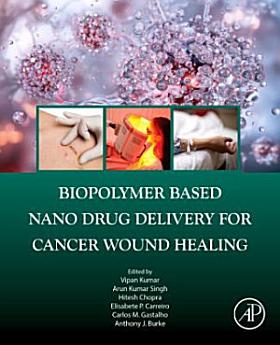Biopolymer Based Nano Drug Delivery for Cancer Wound Healing
About this ebook
About the author
Vipan Kumar is working as a Professor (Associate) at Department of Pharmaceutical Chemistry, JCDM College of Pharmacy, Sirsa. Dr. Kumar has more than 10 years of teaching and research experience. He has published dozens of publications in peer-reviewed international and national journal. He has authored 2 books. Dr. Kumar is an editorial and reviewer board member of several scientific journals of intentional repute. He is also serving as a CPCSEA Nominee in various institutes’ IAEC committees and served in University PGBOS committees.
Arun Kumar Singh completed his Master of Pharmacy (M. Pharm) in Pharmaceutics from Galgotias University, Greater Noida, India. He is currently an Assistant Professor in the Department of Pharmacy at Vivekanand Global University, where he is actively engaged in teaching and research. His research interests encompass various emerging and interdisciplinary fields, including nano-formulation, blockchain technology, the Internet of Things (IoT), machine learning, cancer biology, artificial intelligence, big data analytics, and neuroscience. Demonstrating a strong commitment to academic excellence, Mr. Singh has made significant contributions to the scientific community.
Dr. Hitesh Chopra, PhD currently at Saveetha School of Engineering is working in primarily area of interest includes nanoformulations, natural polymers, cancer, and wound healing and metabolic disorders. He has authored several papers in high-repute journals with total impact factor more than 1000
Elisabete P. Carreiro is an invited auxiliary researcher at the Associated Lab for Green Chemistry - Clean Technologies and Processes (LAQV@REQUIMTE)-University of Évora (UE). For the past decade years, she has been a PhD Researcher and her research has focused on the areas of organic synthesis and (nano)materials (polymeric, inorganic and smart), sustainable catalysis and medicinal chemistry. She is interested in the development of new molecules and nanomaterials for medicinal purposes and sustainable technologies. She published dozens of articles, one patent, several book chapters and more than 50 communications (posters and oral presentations at international conferences). She has been a team member and collaborator on many research projects. She has supervised doctoral, master and undergraduate students.
Carlos M. Gastalho graduated in Pharmaceutical Sciences (MSc, PharmD.) in 2012 from the Faculty of Pharmacy of University of Coimbra and he is currently a PhD Student FCT Grant at University of Évora. His research activity is based on the development of polymeric nanosystems for drug entrapment (either hydrophilic also hydrophobic) with biological and pharmacological activity further assessed through preclinical assays in cell culture. He has also attended several congresses and Symposia related to his PhD and has presented poster communications, was author of abstract publications, co-author of a publication, and co-editor of one book. He participated in the organization of several scientific events. He has also participated, as co-supervisor of High School ERASMUS+ students at the Laboratory of Biochemistry (University of Évora, 2021), also one Bachelor Student in the Biotechnology field (University of Évora, 2022).
Anthony J. Burke is an associate professor in pharmaceutical chemistry at the faculty of pharmacy, University of Coimbra. He is an integrated member of the Coimbra Chemistry-Institute for Molecular Chemistry. He has about 180 scientific publications in chemistry including books, book chapters, editorials, papers, book entries, US, European and Portuguese patents and several invited and accepted talks. He was the vice-president of the organic chemistry division of Portuguese Society of Chemistry between 2011-2013 and was admitted as a Fellow of ChemPubSoc Europe in 2020. He was chairman for the 1st five editions of the International Symposium on Synthesis and Catalysis (ISySyCat) and also for the 6th edition in 2025. He is an associate editor for Frontiers in Chemistry – Medicinal and Pharmaceutical Chemistry and an editorial board member of Chemistry Open.





